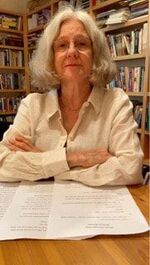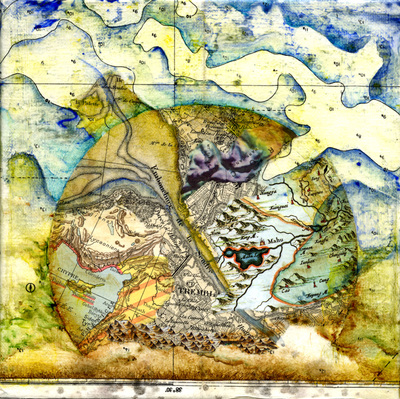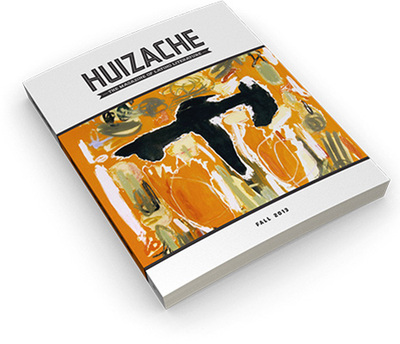MARTHA WISEMAN
Loose Ends
I do not move: a habitual state.
I take my cue from Samuel Beckett, who famously ends his Waiting for Godot with these two lines and the final stage direction: Vladimir: Well? Shall we go? Estragon: Yes, let’s go. And the clincher: They do not move.
I consider this ending talismanic, or perhaps merely descriptive.
I plan to and say I will do something, and then I do not move, I do not act. I do not do. The result is a sense of entrapment: I’ve done it again, which sounds a lot like having done something. What I mean is, I have not done x or y—again. Which is a script that readily engenders remorse, self-accusation, ultimately fatigue, so that, yes, I cannot move. The x or y might be mulching the garden or cleaning the bathroom, might be writing or—writing. As I lower myself into bed for hours of not moving, I make my list of tasks I have not completed or even begun, an encyclopedic compendium of the unaccomplished and the unexpressed. But here I am, expressing what I haven’t expressed. Yet.
Which is why I turn to Beckett, who managed to create endings that insist on an inevitable closing down—of possibility, of movement, of any chance to avoid the closing down—and that at the same time are always occurring, that are the action and cap the action, that signal a completion and yet go on, well, endlessly.
Frank Kermode argues, in his classic The Sense of an Ending, that we humans are end-focused precisely because we fear our own mortality. Contemplating death— of an individual, a culture, a world— means we have had to come up with afterlives; we’ve imagined last days, which seem to keep repeating, from the earliest recorded prophecies of the world’s end on a particular date until—well, up till now. And with each repetition, with each unfulfilled prediction of last days, we experience a letdown: What, not yet?
Or not ever. In one particular case, I hastened toward an end without any beginning. I did more than make a prediction: I decided not to have children. I reached this conclusion, this end, without dithering or obsessing or turning away—not “I can’t do this now,” but “I won’t do this at all.” At least, I think that is what happened.
I was in my early thirties when a friend of my then-husband’s was thinking aloud about the children he might have: “Just imagine,” he said, “those little tow-headed people” (he himself was blond). I must have given him only a half-hearted smile, because he asked me, “Don’t you want kids?”
“No,” I said.
“Really? Why not?”
“I don’t think that giving life to another human being is much of a gift,” I said. He was shocked.
In the U.S., as the pandemic has closed in, and has closed us in, as incidents of racial brutality have become more and (vitally) more visible to everyone, as a rankling divisiveness has made itself increasingly and uneasily apparent, as we confront daily evidence of our destruction of the planet, we have begun to say things like, “These feel like the end-times.” Perhaps such a feeling and such a statement simply reflect, in somewhat exaggerated terms, the crises that face us, reflect our sense of being overwhelmed by what we haven’t solved, the accumulation of which we think we cannot fully apprehend. But as Kermode assures us, last days have been happening or about to happen for millennia. The world has always been about to end—because we are. Imminence is all.
“Remember,” I asked my choreographer friend, “that dance you performed back at school, on an outdoor concrete circle, going round and round to endings of Beethoven’s?”
“Oh,” she says, “that dance was to the Goldberg Variations.”
“Then what am I thinking of? Didn’t you—”
“I did contemplate a piece,” she tells me, “using a collage score made up of multiple repetitions of the end of Beethoven’s Fifth—I had an idea the sound could be a metaphor for, I don’t know, eternity, or constant conclusion as I went round in a circle. But the effect was actually horrifying, like death played over and over.”
I must remember her talking, all those years ago, about such a piece. At least I can be assured that I didn’t make it up entirely, her dancing to the ends.
Not moving, not doing: These mean that I have for much of my life been a chronic postponer. Out of anxiety, terror, inertia, more terror, I have postponed writing, cleaning, looking for work, major and minor decisions. Postponement in turn means that the end cannot, in theory, be reached. Do I dread an ending? Why then have I also found myself waiting for things to end? Or, at least, waiting to be done with whatever it is I must do or even what I want to do? It will be too hard, it will take too long.... my mother’s voice, echoing in my brain, though I have taken over the words and made them mine. The task, large or small, is far too daunting. And yet I imagine being done with what I won’t or can’t do, at which point I can rest. The catch: I’m already resting from the labor of thinking about doing and being done.
So I am waiting to be done with something I dare not start. The postponement, the waiting, create a kind of interstice, a world in half-light.
For many years, my sense of an ending was my own end. Forget the half-light; let’s go for full-on darkness. I could not believe in a future, at least not for me. Time was always ending, despite appearances to the contrary.
All depressives know that “future” is a useless concept: tomorrow and tomorrow and tomorrow. Tomorrow will only repeat yesterday and today, which are already elided. But depressives also recognize a form of eternity—an eternity of psychic pain, or melancholy, or paralysis; but then eternity negates any need for time divisions or tenses. Nothing can be divided into chapters; there is one, and only one, endless sentence.
I got very used to hearing in my head: I wish I were dead. But my habit of postponement came to the rescue: I postponed dying, until I (mostly) managed to outlive any desire for it.
“I don’t know how to die,” my mother told the hospice social worker. Afraid of a future that had to be an oxymoron, a nullity, that simply would not be, that would negate the very possibility of futurity and self. She stubbornly refused to ask me to come to her until the near-last minute, and I had stubbornly refused to go until she asked. I slept in a chair beside her bed through one night, during which she was in and out of consciousness, mostly out. Several times during that night, she opened her eyes wide and seemed to gaze hard at me. Once, she exclaimed, “You’re beautiful!” and once she asked me very clearly, “Do you want to go back to your husband?” “No, Mama, I don’t,” I said. Then she lapsed back into unconsciousness.
I went to breakfast in the morning, and when I came back, she was dead. One ending, and then the steps in what seemed like an ongoing end—washing her as she’d requested; wrapping her in a sheet as she’d also requested; refusing to watch the crematorium people transfer her to a gurney and wheel her out of the building (I fled to a social worker’s office, one of the few times I wept); receiving the package of her ashes from the crematorium and wanting to put it down as quickly as possible, relieved when a friend of hers offered to keep the ashes for me.
I witnessed my stepmother’s and my father’s decline. I did not, however, witness either of their deaths, some fifteen years after my mother’s. I attended to end matters, which dragged on, as such matters routinely do. Once his wife was gone, my father, in a kind of delirium, wanted his life to end. Between my stepmother and me, between my father and me, there had been no deathbed good-byes—official, novelistic, maudlin, uplifting, or otherwise.
The summer after my father’s death I began reading Kermode’s Sense of an Ending. I was not, for some time, able to finish it.
This would make a good joke, except that it is perfectly true.
Postponing, I realize, is a version of magical thinking. When I think, There is no future, so I will never have to do what I’m postponing, I am sending the postponed into an absolute void, and all I have not yet done disappears, the very act of postponing depends on there being time beyond the moment in which to do something. Later, later, I’ll decide later.
Then the future I’ve claimed not to believe in rushes through me, threatening to uproot me, forcing me to look ahead and see relentless prospects of emptiness.
I can tie myself in knots, which results in an inability to do or to move. Mission accomplished.
My close friends decided on a different kind of accomplishment. They had put off childbearing, at least in comparison to earlier generations, but hitting thirty-five, they now actively refused to postpone a future in which they would not be parents. They heard the proverbial biological clock ticking very loudly, and soon there was a veritable bumper crop of babies.
I hadn’t been around babies much at all in my life up till then —no siblings, no teenaged babysitting jobs—so the whole affair was novel. I was surprised, for instance, that the presence of a baby commandeered the attention of every adult nearby. I was not surprised by the demands of a baby, toddler, schoolchild, upon a parent, but I naively hadn’t reckoned on my friendships’ altering. Lest this sound hopelessly egotistical, I’ll say that I loved these babies, held them, crooned to them, listened to talk of their exploits, though I also marveled at the deficit of energy left by my tending to them.
Now that these children are grown, it’s hard to remember the initial strangeness of it all. Now I can feel even greater gratitude that I’ve had these children in my life.
It’s true that sometimes as I felt the bundles of blanketed flesh so close to me, as I held the hand of each toddler, fiercely protective, I felt a physical tightening, a tug of desire. I felt a pang of projected melancholy. Suppose, I thought, when I’m older, I’ll regret not having had a child?
I told my mother once that I might like to have children someday. I don’t believe I’d ever mentioned the idea before—she had certainly never broached the topic with me. I was still married to my first husband then, and I was visiting my mother after a long hiatus—a reconciliation visit. Perhaps bringing up the possibility of children—as opposed to actually bringing them up—occurred to me as a kind of peace offering, a smoothing and soothing between us, a gesture toward a tentative closeness, but not necessarily a real leaning. She sighed and said, “That would be nice.” She added in a lower voice, “I only hope I’m alive to see your children.”
I realized that my “someday” suggested a future so abstract it could erase itself.
She died, and I did not have children, so at least I did not directly deny her wish to see them.
I associate that time of my friends’ fecundity with the title of a Wallace Stevens poem, “Palace of the Babies.” But the poem has a darker turn of mind, focusing on a central figure, the “disbeliever,” who “walked the moonlit place....”
Night nursed not him in whose dark mind
The clambering wings of birds of black revolved,
Making harsh torment of the solitude.
The walker in the moonlight walked alone….
These are images of isolation, of being out of the fold. And so, in a way, I felt myself to be.
The tugs toward motherhood and the pangs of projected regret did not last. How could I know what I would feel in years I could not envision? Remember, I told myself, you don’t believe in a future—except for the kids, of course, they deserve a future. Having grown up with a depressed mother, depleted by depression myself, I could foresee only an oppressive repetition, which might have been the same thing as an inability to imagine a (different) future. All I could offer a child might be the burden of depression. If I had read Winnicott at the time, I might have said, I would never be a good-enough mother, but that statement once again presumes a future, doesn’t it? Anyway, my then-husband was clear that visiting our friends’ children came as close to parenting as he could manage.
I might well have suspected that my marriage could not sustain the addition of a child. The marriage might not even sustain me, nor I sustain it, a fear I barely allowed myself to acknowledge.
I have to ask: Was I waiting for my marriage to end? Or was I postponing its end? A little of both.
My husband and I had separated and I’d moved away when he called to say we’d better go ahead with our divorce, and soon, because—it took some minutes for him to reach this admission—he and the woman he now planned to marry were expecting a child. That same day, as a friend and I were walking up a winding road and I was telling her my news, she said she’d just learned that her remarried ex-husband—she and he had two grown sons with children of their own—was about to have a baby, who would be of an age with his grandchildren. We both gasped, half-laughing, a little stunned, trying to make sense of our anger and regret and relief and the sound of doors slamming shut.
For some years after the deaths of my parents, I dreamed fairly frequently that my father and my stepmother were still alive, or alive again, but in a fairly decrepit state—mobile, but just barely. My stepmother had found a purse full of assorted trinkets, and she said she had been saving it for me. She opened it, pulled out a little sack, and said, “This is for your children.” I turned to my father, who was looking on, and said, “I won’t have any children.” He looked at me with that half-surprised, half-stricken expression I knew well: “No?” he said. “No,” I said: “I’m too old, it’s not possible.” He looked away, in shame or disappointment.
My mother appears less and less frequently in my dreams, but when I do dream of her, she never actually appears. There is only the absolute necessity that I get in touch with her—only I don’t know where she’s living, or I don’t have a phone number for her, or the phone squirms out of my hands, or I’m told she’s already left. I seem not to have seen her or spoken with her in some time. What I have to tell her—little? nothing?—is not clear.
I can see that, in the abstract realm as well as in the not-so-abstract genetic code, children provide continuity. On the other hand, the birth of a child is a major disruption of any former continuity. Continuity and disruption are entwined together. Time carries us and buffets us. We accrue new selves but keep glancing backward at who we once were and notice those earlier selves continuing to interact with our new or revised selves. Continuity allows access to the long view, but as Philip Larkin reminds us, it’s a view we tend to shy away from: “Truly though our element is time, / We’re not suited to the long perspectives, / Open at each instant of our lives.” Perhaps children fill that long view and simultaneously close it off.
If I had children, the double take of my own aging might be doubled again by my children’s accumulation of years: How can he be ten? If she’s twenty-two, then.... Two timelines would intersect. Each child would become a mirror reflecting me at a younger age—not necessarily me at the age of the child (my memory is too poor for that) but my age when the child was younger. A child becomes a marker, a timepiece, a constant reminder that the parent is aging too. More disruptions, more continuity.
My mother had been clear that she did not want a funeral. Instead, she wanted a party thrown in her honor, with music and champagne.
I did not give her the party, but friends of hers did, some six months after she died. I was not able to attend.
I gave my father a funeral, as he would have expected. I contemplated a memorial for him—a proper event in a theater, contributions from fellow actors, clips from his performances, scripted good-byes—but I postponed the decision and any actual preparations. It’s true that very few of my father’s fellow actors, those he’d worked with or known well, were still alive, and there was a question of who might actually attend. Then came another death: a friend and admirer of my father’s who was also the director of the space I’d deemed most appropriate for a memorial. Soon such an event began to seem not only unfeasible but anticlimactic. I thought, an actor can’t keep exiting, except in a farce, which depends on doors opening and closing and opening again.
When I finished Kermode’s Sense of an Ending, I confess it felt anticlimactic.
“Little is left to tell,” says R, the Reader. So begins Beckett’s short play Ohio Impromptu. The Reader reads a book to L, the Listener; they are, Beckett instructs “[a]s alike in appearance as possible.” The book may be a narrative of the Listener’s (and the Reader’s?) life; it may also be a herald of his death. The Listener is mute but knocks on the table at which the two are seated to indicate that the Reader should stop or repeat a phrase or continue reading. The last line of the book and the play: “Nothing is left to tell,” which the Reader repeats at the Listener’s insistent knock and then closes the book.
Yet how can “Nothing is left to tell” signal a true end? Though the reading is apparently completed, the book, already committed to print, can be read again and again. The play can be performed again and again. The essential shift from little to nothing seems always to be in the process of occurring.
And so the nothing is both held off and embraced. The little and the nothing exist because of their own repetitions. The endings replay themselves: there is room for both ongoingness and finality.
The finality never ends.
I take my cue from Samuel Beckett, who famously ends his Waiting for Godot with these two lines and the final stage direction: Vladimir: Well? Shall we go? Estragon: Yes, let’s go. And the clincher: They do not move.
I consider this ending talismanic, or perhaps merely descriptive.
I plan to and say I will do something, and then I do not move, I do not act. I do not do. The result is a sense of entrapment: I’ve done it again, which sounds a lot like having done something. What I mean is, I have not done x or y—again. Which is a script that readily engenders remorse, self-accusation, ultimately fatigue, so that, yes, I cannot move. The x or y might be mulching the garden or cleaning the bathroom, might be writing or—writing. As I lower myself into bed for hours of not moving, I make my list of tasks I have not completed or even begun, an encyclopedic compendium of the unaccomplished and the unexpressed. But here I am, expressing what I haven’t expressed. Yet.
Which is why I turn to Beckett, who managed to create endings that insist on an inevitable closing down—of possibility, of movement, of any chance to avoid the closing down—and that at the same time are always occurring, that are the action and cap the action, that signal a completion and yet go on, well, endlessly.
Frank Kermode argues, in his classic The Sense of an Ending, that we humans are end-focused precisely because we fear our own mortality. Contemplating death— of an individual, a culture, a world— means we have had to come up with afterlives; we’ve imagined last days, which seem to keep repeating, from the earliest recorded prophecies of the world’s end on a particular date until—well, up till now. And with each repetition, with each unfulfilled prediction of last days, we experience a letdown: What, not yet?
Or not ever. In one particular case, I hastened toward an end without any beginning. I did more than make a prediction: I decided not to have children. I reached this conclusion, this end, without dithering or obsessing or turning away—not “I can’t do this now,” but “I won’t do this at all.” At least, I think that is what happened.
I was in my early thirties when a friend of my then-husband’s was thinking aloud about the children he might have: “Just imagine,” he said, “those little tow-headed people” (he himself was blond). I must have given him only a half-hearted smile, because he asked me, “Don’t you want kids?”
“No,” I said.
“Really? Why not?”
“I don’t think that giving life to another human being is much of a gift,” I said. He was shocked.
In the U.S., as the pandemic has closed in, and has closed us in, as incidents of racial brutality have become more and (vitally) more visible to everyone, as a rankling divisiveness has made itself increasingly and uneasily apparent, as we confront daily evidence of our destruction of the planet, we have begun to say things like, “These feel like the end-times.” Perhaps such a feeling and such a statement simply reflect, in somewhat exaggerated terms, the crises that face us, reflect our sense of being overwhelmed by what we haven’t solved, the accumulation of which we think we cannot fully apprehend. But as Kermode assures us, last days have been happening or about to happen for millennia. The world has always been about to end—because we are. Imminence is all.
“Remember,” I asked my choreographer friend, “that dance you performed back at school, on an outdoor concrete circle, going round and round to endings of Beethoven’s?”
“Oh,” she says, “that dance was to the Goldberg Variations.”
“Then what am I thinking of? Didn’t you—”
“I did contemplate a piece,” she tells me, “using a collage score made up of multiple repetitions of the end of Beethoven’s Fifth—I had an idea the sound could be a metaphor for, I don’t know, eternity, or constant conclusion as I went round in a circle. But the effect was actually horrifying, like death played over and over.”
I must remember her talking, all those years ago, about such a piece. At least I can be assured that I didn’t make it up entirely, her dancing to the ends.
Not moving, not doing: These mean that I have for much of my life been a chronic postponer. Out of anxiety, terror, inertia, more terror, I have postponed writing, cleaning, looking for work, major and minor decisions. Postponement in turn means that the end cannot, in theory, be reached. Do I dread an ending? Why then have I also found myself waiting for things to end? Or, at least, waiting to be done with whatever it is I must do or even what I want to do? It will be too hard, it will take too long.... my mother’s voice, echoing in my brain, though I have taken over the words and made them mine. The task, large or small, is far too daunting. And yet I imagine being done with what I won’t or can’t do, at which point I can rest. The catch: I’m already resting from the labor of thinking about doing and being done.
So I am waiting to be done with something I dare not start. The postponement, the waiting, create a kind of interstice, a world in half-light.
For many years, my sense of an ending was my own end. Forget the half-light; let’s go for full-on darkness. I could not believe in a future, at least not for me. Time was always ending, despite appearances to the contrary.
All depressives know that “future” is a useless concept: tomorrow and tomorrow and tomorrow. Tomorrow will only repeat yesterday and today, which are already elided. But depressives also recognize a form of eternity—an eternity of psychic pain, or melancholy, or paralysis; but then eternity negates any need for time divisions or tenses. Nothing can be divided into chapters; there is one, and only one, endless sentence.
I got very used to hearing in my head: I wish I were dead. But my habit of postponement came to the rescue: I postponed dying, until I (mostly) managed to outlive any desire for it.
“I don’t know how to die,” my mother told the hospice social worker. Afraid of a future that had to be an oxymoron, a nullity, that simply would not be, that would negate the very possibility of futurity and self. She stubbornly refused to ask me to come to her until the near-last minute, and I had stubbornly refused to go until she asked. I slept in a chair beside her bed through one night, during which she was in and out of consciousness, mostly out. Several times during that night, she opened her eyes wide and seemed to gaze hard at me. Once, she exclaimed, “You’re beautiful!” and once she asked me very clearly, “Do you want to go back to your husband?” “No, Mama, I don’t,” I said. Then she lapsed back into unconsciousness.
I went to breakfast in the morning, and when I came back, she was dead. One ending, and then the steps in what seemed like an ongoing end—washing her as she’d requested; wrapping her in a sheet as she’d also requested; refusing to watch the crematorium people transfer her to a gurney and wheel her out of the building (I fled to a social worker’s office, one of the few times I wept); receiving the package of her ashes from the crematorium and wanting to put it down as quickly as possible, relieved when a friend of hers offered to keep the ashes for me.
I witnessed my stepmother’s and my father’s decline. I did not, however, witness either of their deaths, some fifteen years after my mother’s. I attended to end matters, which dragged on, as such matters routinely do. Once his wife was gone, my father, in a kind of delirium, wanted his life to end. Between my stepmother and me, between my father and me, there had been no deathbed good-byes—official, novelistic, maudlin, uplifting, or otherwise.
The summer after my father’s death I began reading Kermode’s Sense of an Ending. I was not, for some time, able to finish it.
This would make a good joke, except that it is perfectly true.
Postponing, I realize, is a version of magical thinking. When I think, There is no future, so I will never have to do what I’m postponing, I am sending the postponed into an absolute void, and all I have not yet done disappears, the very act of postponing depends on there being time beyond the moment in which to do something. Later, later, I’ll decide later.
Then the future I’ve claimed not to believe in rushes through me, threatening to uproot me, forcing me to look ahead and see relentless prospects of emptiness.
I can tie myself in knots, which results in an inability to do or to move. Mission accomplished.
My close friends decided on a different kind of accomplishment. They had put off childbearing, at least in comparison to earlier generations, but hitting thirty-five, they now actively refused to postpone a future in which they would not be parents. They heard the proverbial biological clock ticking very loudly, and soon there was a veritable bumper crop of babies.
I hadn’t been around babies much at all in my life up till then —no siblings, no teenaged babysitting jobs—so the whole affair was novel. I was surprised, for instance, that the presence of a baby commandeered the attention of every adult nearby. I was not surprised by the demands of a baby, toddler, schoolchild, upon a parent, but I naively hadn’t reckoned on my friendships’ altering. Lest this sound hopelessly egotistical, I’ll say that I loved these babies, held them, crooned to them, listened to talk of their exploits, though I also marveled at the deficit of energy left by my tending to them.
Now that these children are grown, it’s hard to remember the initial strangeness of it all. Now I can feel even greater gratitude that I’ve had these children in my life.
It’s true that sometimes as I felt the bundles of blanketed flesh so close to me, as I held the hand of each toddler, fiercely protective, I felt a physical tightening, a tug of desire. I felt a pang of projected melancholy. Suppose, I thought, when I’m older, I’ll regret not having had a child?
I told my mother once that I might like to have children someday. I don’t believe I’d ever mentioned the idea before—she had certainly never broached the topic with me. I was still married to my first husband then, and I was visiting my mother after a long hiatus—a reconciliation visit. Perhaps bringing up the possibility of children—as opposed to actually bringing them up—occurred to me as a kind of peace offering, a smoothing and soothing between us, a gesture toward a tentative closeness, but not necessarily a real leaning. She sighed and said, “That would be nice.” She added in a lower voice, “I only hope I’m alive to see your children.”
I realized that my “someday” suggested a future so abstract it could erase itself.
She died, and I did not have children, so at least I did not directly deny her wish to see them.
I associate that time of my friends’ fecundity with the title of a Wallace Stevens poem, “Palace of the Babies.” But the poem has a darker turn of mind, focusing on a central figure, the “disbeliever,” who “walked the moonlit place....”
Night nursed not him in whose dark mind
The clambering wings of birds of black revolved,
Making harsh torment of the solitude.
The walker in the moonlight walked alone….
These are images of isolation, of being out of the fold. And so, in a way, I felt myself to be.
The tugs toward motherhood and the pangs of projected regret did not last. How could I know what I would feel in years I could not envision? Remember, I told myself, you don’t believe in a future—except for the kids, of course, they deserve a future. Having grown up with a depressed mother, depleted by depression myself, I could foresee only an oppressive repetition, which might have been the same thing as an inability to imagine a (different) future. All I could offer a child might be the burden of depression. If I had read Winnicott at the time, I might have said, I would never be a good-enough mother, but that statement once again presumes a future, doesn’t it? Anyway, my then-husband was clear that visiting our friends’ children came as close to parenting as he could manage.
I might well have suspected that my marriage could not sustain the addition of a child. The marriage might not even sustain me, nor I sustain it, a fear I barely allowed myself to acknowledge.
I have to ask: Was I waiting for my marriage to end? Or was I postponing its end? A little of both.
My husband and I had separated and I’d moved away when he called to say we’d better go ahead with our divorce, and soon, because—it took some minutes for him to reach this admission—he and the woman he now planned to marry were expecting a child. That same day, as a friend and I were walking up a winding road and I was telling her my news, she said she’d just learned that her remarried ex-husband—she and he had two grown sons with children of their own—was about to have a baby, who would be of an age with his grandchildren. We both gasped, half-laughing, a little stunned, trying to make sense of our anger and regret and relief and the sound of doors slamming shut.
For some years after the deaths of my parents, I dreamed fairly frequently that my father and my stepmother were still alive, or alive again, but in a fairly decrepit state—mobile, but just barely. My stepmother had found a purse full of assorted trinkets, and she said she had been saving it for me. She opened it, pulled out a little sack, and said, “This is for your children.” I turned to my father, who was looking on, and said, “I won’t have any children.” He looked at me with that half-surprised, half-stricken expression I knew well: “No?” he said. “No,” I said: “I’m too old, it’s not possible.” He looked away, in shame or disappointment.
My mother appears less and less frequently in my dreams, but when I do dream of her, she never actually appears. There is only the absolute necessity that I get in touch with her—only I don’t know where she’s living, or I don’t have a phone number for her, or the phone squirms out of my hands, or I’m told she’s already left. I seem not to have seen her or spoken with her in some time. What I have to tell her—little? nothing?—is not clear.
I can see that, in the abstract realm as well as in the not-so-abstract genetic code, children provide continuity. On the other hand, the birth of a child is a major disruption of any former continuity. Continuity and disruption are entwined together. Time carries us and buffets us. We accrue new selves but keep glancing backward at who we once were and notice those earlier selves continuing to interact with our new or revised selves. Continuity allows access to the long view, but as Philip Larkin reminds us, it’s a view we tend to shy away from: “Truly though our element is time, / We’re not suited to the long perspectives, / Open at each instant of our lives.” Perhaps children fill that long view and simultaneously close it off.
If I had children, the double take of my own aging might be doubled again by my children’s accumulation of years: How can he be ten? If she’s twenty-two, then.... Two timelines would intersect. Each child would become a mirror reflecting me at a younger age—not necessarily me at the age of the child (my memory is too poor for that) but my age when the child was younger. A child becomes a marker, a timepiece, a constant reminder that the parent is aging too. More disruptions, more continuity.
My mother had been clear that she did not want a funeral. Instead, she wanted a party thrown in her honor, with music and champagne.
I did not give her the party, but friends of hers did, some six months after she died. I was not able to attend.
I gave my father a funeral, as he would have expected. I contemplated a memorial for him—a proper event in a theater, contributions from fellow actors, clips from his performances, scripted good-byes—but I postponed the decision and any actual preparations. It’s true that very few of my father’s fellow actors, those he’d worked with or known well, were still alive, and there was a question of who might actually attend. Then came another death: a friend and admirer of my father’s who was also the director of the space I’d deemed most appropriate for a memorial. Soon such an event began to seem not only unfeasible but anticlimactic. I thought, an actor can’t keep exiting, except in a farce, which depends on doors opening and closing and opening again.
When I finished Kermode’s Sense of an Ending, I confess it felt anticlimactic.
“Little is left to tell,” says R, the Reader. So begins Beckett’s short play Ohio Impromptu. The Reader reads a book to L, the Listener; they are, Beckett instructs “[a]s alike in appearance as possible.” The book may be a narrative of the Listener’s (and the Reader’s?) life; it may also be a herald of his death. The Listener is mute but knocks on the table at which the two are seated to indicate that the Reader should stop or repeat a phrase or continue reading. The last line of the book and the play: “Nothing is left to tell,” which the Reader repeats at the Listener’s insistent knock and then closes the book.
Yet how can “Nothing is left to tell” signal a true end? Though the reading is apparently completed, the book, already committed to print, can be read again and again. The play can be performed again and again. The essential shift from little to nothing seems always to be in the process of occurring.
And so the nothing is both held off and embraced. The little and the nothing exist because of their own repetitions. The endings replay themselves: there is room for both ongoingness and finality.
The finality never ends.
Copyright © February 2023 Martha Wiseman
|
Martha Wiseman is a retired literature and writing professor of Skidmore College's English Department as well as the writing center director. The Georgia Review has published four of her essays, the latest in Fall 2019. Her poems have appeared in a variety of journals, and White Eagle Coffee Store Press brought out a long story, “Double Vision” (2004), as a chapbook. Her “Dreams of Foreign Cities,” a prize-winner in Fish Publishing’s Short Memoir Contest, was published in Fish Anthology 2021. Work has also appeared in Ponder Review, Dorothy Parker’s Ashes, Under the Sun, The Santa Ana River Review, and The Bookends Review, and an essay is forthcoming in 2023 from Queen’s Quarterly.
|










